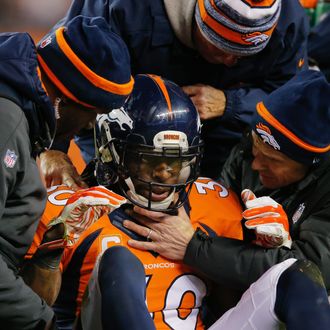
ESPN’s Outside the Lines had previously reported that the NFL had backed away from funding a major study looking at the relationship between football and brain disease because it would be overseen by a researcher who’s been critical of the league. At the time, the NFL called the report “inaccurate,” but now Outside the Lines has published an even more comprehensive look at the league’s funding of concussion-related research, calling it “a secretive funding apparatus with its own set of rules, one that often rewards league doctors, punishes critics and, some researchers believe, steers research away from potentially uncomfortable truths about the relationship between football and brain disease.” Here’s what you need to know about the bombshell report.
How much money is the NFL putting toward research?
Quite a bit. The league and its partners, according to the report, have committed more than $100 million for research studies. The league is funding what ESPN calls a “broad spectrum” of research using, for instance, neuroimaging and blood samples. It’s also funding new technologies such as goggles that measure changes in eye movement associated with head trauma. The NFL’s 2012 pledge of $30 million to the National Institutes of Health was the largest individual donation in the league history, and the NFL became one of the 13 largest donors to the Foundation for the NIH, which raises private money for NIH research.
So what’s the problem?
Even when the league first made its pledge, senior officials at the NIH debated whether to even accept it, in part because of concerns that the league would try to control how it was used. Indeed, years later, some in the research community believe the league has done just that. According to the report, “in at least six instances over the past two years, NFL-affiliated grants totaling several million dollars have gone to scientists or institutions directly connected to the league, the data show.” The report points out the pitfalls of industry-funded research, noting that the tobacco industry funded thousands of studies with the goal of denying a connection between smoking and lung disease. In the NFL’s case, according to the report, some believe the league “steers research away from potentially uncomfortable truths about the relationship between football and brain disease.” It’s also worth noting that the league’s track record on the issue isn’t great. In 1994, the league formed its own research committee, which repeatedly denied a link between the sport and brain disease. It was disbanded in 2009, at which point the league began working with respected researchers, with commissioner Roger Goodell saying the league was “going to let the medical people decide” whether there’s a link.
How exactly does the league allegedly try to control research?
The report cites three examples. One is the NIH study that the league allegedly backed out of funding because it was to be funded by a Boston University researcher who’s been critical of the league in the past. (That particular situation is complicated further by the way it was challenged: Dr. Richard Ellenbogen, the co-chairman of the NFL’s powerful Head, Neck and Spine Committee, participated in the call as an adviser to the league, even though he was also an applicant for the same grant. One researcher who works with the NIH said that this “undermines the integrity of the entire peer-review process.”) The NIH ultimately used taxpayer money to fund the study.
In another example, the league had funded a report that questioned the accuracy of helmet sensors. According to the expert who edited the paper, the researchers hired by the league set unattainable standards for the sensors’ accuracy, and later used the results to justify suspending the implementation of the sensors in the NFL.
In a third example, ESPN points to a dispute it previously reported on between the NFL and the union that “significantly diminished a previously announced $100 million Harvard study on player health, with the league ultimately declining to participate.”
For its report, ESPN spoke with two researchers from Purdue University who will no longer accept money from the NFL because they say they’ve seen too many examples of influence and scientific bias. According to one of those researchers: “A while back, we talked about all the folks who have ended up on the Head, Neck and Spine Committee, and we think there’s a pretty clear demarcation between the research they did before they were funded by the league or tied to the NFL, and the research they did after they were tied to the league.” The ESPN report notes that some researchers believe Kevin Guskiewicz, once a harsh NFL critic and now the chair of its Subcommittee on Safety Equipment and Playing Rules, has softened his previous positions. (He says that his positions have remained consistent.)
What’s the NFL’s response to all of this?
A league spokesperson said in an email to ESPN that “As it relates to head health, the league is funding scientific and medical research by leading independent experts around the world to advance understanding of brain injuries. This research is moving forward, and as it does, we will use it to improve how our athletes train and play the game.”
Ellenbogen said it’s wrong to suggest the league is trying to control research. From the report:
“What you are seeing is just how well-intentioned scientists debate the different approaches, how competitive the grants are, and fortunately how much interest there is in this research,” he wrote. “This is not about the NFL stopping [brain research]. Quite the opposite. … The NFL directly or indirectly funded much of it to the tune of millions.”
Is anyone else looking into these claims?
Yes. Outside the Lines says that as a result of its reporting, four Democrats on the House Energy & Commerce Committee have requested information about the NFL’s funding relationship from the NIH and FNIH. The report says that both agencies say they are working to comply with that request.





























